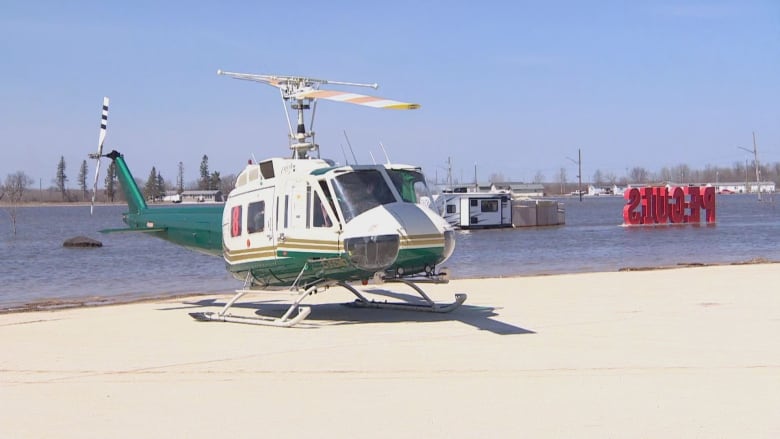Officials visit Peguis First Nation to get aerial view of historic flooding
Community in Manitoba's Interlake hired helicopter to get better sense of flooding situation
Government officials were in Peguis First Nation Thursday to see just how bad the flooding is this year.
The community in Manitoba's Interlake hired a helicopter to get an aerial view of the flooding in the region, which is the worst since 1962, according to the province's infrastructure minister.
"I wanted them to see and understand that first-hand, and that's the reason why we hired this helicopter today," said Chief Glenn Hudson.
Both federal and provincial staff were in the community Thursday.
From up high, Indigenous Services Canada regional director Kandice Leonard could see how widespread the flooding is.
"There is a tremendous amount of water," she said.
"And in the helicopter … I said, 'Give me some perspective — what water should actually be here?' And the answer was none of it, right? Except for the actual riverway."

Water levels on the Fisher River rose late last month, following heavy precipitation in April and ice jams at the mouth of the river last weekend.
Peguis declared a state of emergency last week and issued an evacuation order over the weekend, as the flooding Fisher River washed out roads and breached dikes.
As of Thursday, more than 1,400 people have left the community because their homes aren't safe.
The largest First Nation community in Manitoba, Peguis has 3,521 members living on reserve and 6,504 off-reserve members.
Some homes in the community would now be completely unreachable in an emergency, which is why Peguis has also brought in a private air ambulance to help reach people, both in their community and neighbouring communities such as Fisher River Cree Nation.
Hudson said it was used twice not long after it arrived.

He wants the province to help pay for the service, but nothing has been set in stone yet.
A spokesperson for Infrastructure Minister Doyle Piwniuk said Peguis did not request helicopters to assist with evacuations but had asked Indigenous Services Canada to co-ordinate with the province to have a medevac helicopter stationed in the community on standby.
Shared Health, which co-ordinates medevac helicopter services, said it couldn't station a helicopter in the community, because it is used regularly across the province for emergency medical response, but would provide services if an emergency occurred in the community, the spokesperson said.
Hudson has also previously said Peguis would like military help in fighting the flood, but Leonard said all other resources need to be exhausted first.
"Only once we've come over that threshold of exhausting all other resources would we then look at considering the military," she said.
Meanwhile, about 100 volunteers have arrived in Peguis to help with sandbagging, delivering groceries and other tasks as needed.
Manitoba's flood forecaster said the Fisher River should return within its banks at Peguis by next Monday, and areas downstream should see the river recede later next week.

With files from Sam Samson
